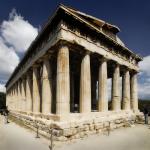|
This section contains 8,084 words (approx. 27 pages at 300 words per page) |

|
Beginnings.
The evidence for the origins of tragic drama is ambiguous. The name itself is odd, for tragoidia means the "song of the male goat," or perhaps a "song for a male goat" and attempts to explain its meaning have been ingenious but never quite successful. The Roman poet Horace, a contemporary of the emperor Augustus, thought that "tragedy" got its name because the prize for the best tragedy was a goat, but this is unlikely. One fact, however, is not disputed: tragedy was intimately connected with the cult of Dionysus, and Aristotle stated that it developed from the dithyramb, a choral song in honor of Dionysus. The great age of Greek tragedy began in Athens when the tyrant Pisistratus established the festival of the City Dionysia about 536 B.C.E. where dithyrambs were presented by amateur choristers. Pisistratus hoped to use the festival to raise...
|
This section contains 8,084 words (approx. 27 pages at 300 words per page) |

|




